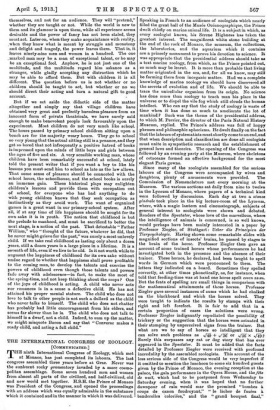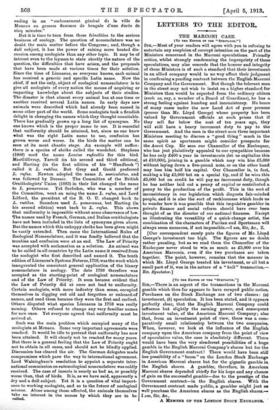THE INTERNATIONAL CONGRESS OF ZOOLOGY. [ComaturrtcaTED.]
THE ninth International Congress of Zoology, which met at Monaco, has just completed its labours. The last congress assembled three years before at Graz. Never was the sunburnt rocky promontory invaded by a more cosmo- politan assemblage. Some seven hundred men and women from almost all parts of the civilized, and half-civilized, old and new world met together. H.S.H. the Prince of- Monaco was President of the Congress, and opened the proceedings with an address which was equally admirable in the substance which it contained and in the manner in which it was delivered.
Speaking in French to an audience of zoologists which nearly filled the great hall of the Musee Oceanographique, the Prince dwelt chiefly on marine animal life. It is a subject in which, as every zoologist knows, his Serene Highness has taken the greatest interest. The magnificent white stone building at the end of the rock of Monaco, the museum, the collections, the laboratories, and the aquarium which it contains are a princely monument to prove his devotion to science. It was appropriate that the presidential address should take as a text marine zoology, from which, as the Prince pointed out, so much may be learnt. It is more than probable that living matter originated in the sea, and, for all we know, may still be forming there from inorganic matter. Had we a complete knowledge of marine zoology we should have discovered all the secrets of evolution and of life. We should be able to trace the unicellular organism from its origin. No science has done more than zoology to teach man his place in the universe or to dispel the vile fog which still clouds the human intellect. Who can say that the study of zoology is waste of time when it has done so much to ameliorate the lot of mankind ? Such was the theme of the presidential address, to which M. Perrier, the director of the Paris Natural History Museum, replied. The Prince's address was full of happy phrases and philosophic aphorisms. He dwelt finally on the fact that the labours of systematists must shortly come to an end, and that when description and classification are done all zoologists must unite in sympathetic research and the establishment of general laws and theories. The opening of the Congress was followed by an evening party at the Museum, where skeletons of cetaceans formed an effective background for the most elegant Paris gowns.
Since many of the zoologists assembled for the serious labours of the Congress were accompanied by wives and
daughters, plenty of amusements were provided. The Commission of Nomenclature met every morning at the Museum. The various sections sat daily from nine to twelve in the Lyceum of Monaco, where papers of a technical kind were followed by discussions. Each day at two a stance generale took place in the big lecture-room of the Lyceum, where, with a magic lantern and cinematograph, subjects of general interest to zoologists were shown and debated. Readers of the Spectator, whose love of the marvellous, where the intelligence of animals is concerned, is so well known, would perhaps have been mainly interested in a paper by Professor Ziegler, of Stuttgart : Ueber die Principien der Tierpsychologie. Having shown some remarkable slides with magnified sections of insects' brains, he passed by stages to the brain of the horse. Professor Ziegler then gave an account of some trained horses whose performances he had investigated both in the presence and the absence of their trainer. These horses, he declared, had been taught to spell words in German which were pronounced to them. The letters they indicated on a board. Sometimes they spelled correctly, at other times phonetically, as, for instance, when told that feeding-time was at hand one horse spelt esscn as en. But the feats of spelling are small things in comparison with the mathematical attainments of these horses. Professor Ziegler gave several instances of sums which he had chalked on the blackboard and which the horses solved. They were taught to indicate the results by stamps with theit right and left forefeet. It is fair to add that in a certain proportion of cases the solutions were wrong. Professor Ziegler indignantly repudiated the possibility of trickery or the suggestion that the horses were actuated in their stamping by unperceived signs from the trainer. But what are we to say of horses so intelligent that they can solve such problems as N/479 + i/N or N/36 x ,j4e p Surely this surpasses any cat or dog story that has ever appeared in the Spectator. It must be added that the facts detailed by Professor Ziegler were received with profound incredulity by the assembled zoologists. This account of the less serious side of the Congress would be very imperfect if it omitted to mention the luncheon to some six hundred guests given by the Prince of Monaco, the evening reception at the palace, the gala performance in the Opera House, and the fete de nuit, which had to be postponed from Wednesday to Saturday evening, when it was hoped that no further downpour of rain would mar the promised " bombes ix coups de canon foudroyant," " le licher de fusees banderolles -coloriees," and the "grand bouquet final,"
ending in an " embrasernent general da is vine de Monaco en grosses flammes de bengale d'une Jur& de cinq minutes."
But it is time to turn from these frivolities to the serious business of zoology. The question of nomenclature was no doubt the main matter before the Congress ; and, though a dull subject, it has the power of raising more heated dis- cussion among zoologists than any other topic. It may be of interest even to the layman to state shortly the nature of the question, the difficulties that have arisen, and the proposals that have been made at various times for their solution. Since the time of Linnaeus, as everyone knows, each animal has received a generic and specific Latin name. Now the chief, if not the only, object of zoological nomenclature is to give all zoologists of every nation the means of acquiring or imparting knowledge about the subjects of their studies. The disaster is that almost every animal has at one time or another received several Latin names. In early days new animals were described which had already been named in some other part of the world. Some zoologists took a fiendish delight in changing the names which they thought unsuitable. There has gradually grown up a long list of synonyms. No one knows which is the proper name to use. It is essential that uniformity should be attained, but, since no one knew what was the right Latin name to use, confusion has grown worse and worse. In the birds the matter can be seen at its most chaotic stage. An example will suffice: there is a species of shrike called the woodchat. Stephens (1809) used the name Lanius ruficollis for this bird. MacGillivray, Yarrell (in his second and third editions), and Harting (in the first edition of his "Handbook ") called it L. rutilus. But Gray and Gould preferred rufus. Newton adopted the name L. auriculatus, and was followed by Dresser. The Committee of the British Ornithologists' Union (1883) in their list changed the name to L. pomeranus. Yet Seebohm, who was a member of the Committee, went on using the name L. rufus, and Lord Lilford, the president of the B. 0. U. changed back to L. rtailus. Saunders used L. pomeranus, but Harting (in his second edition) went back to L. rufus. This shows that uniformity is impossible without some observance of law. The names used by French, German, and Italian ornithologists have not been included in the lists of synonyms given above. But the names which this unhappy shrike has been given might be vastly extended. Then came the International Rules of Zoological Nomenclature, and it was fondly believed that the troubles and confusion were at an end. The Law of Priority was accepted with acclamation as a solution. An animal was to be called in all countries by the Latin name it received from the zoologist who first described and named it. The tenth edition of Linnaeus's Systema Naturae,1758, was the work which inaugurated the consistent general application of the binary nomenclature in zoology. The date 1758 therefore was accepted as the starting-point of zoological nomenclature and of the Law of Priority. It soon became evident that the Law of Priority did at once not lead to uniformity. Certain zoologists, with more industry than sense, occupied themselves in digging out old and forgotten or unheard-of names, and used them because they were the first and earliest. Others disputed what species Linnaeus in 1758 was really naming. Others refused to change any very familiar names for new ones. Yet everyone agreed that uniformity must be arrived at.
Such was the main problem which occupied many of the zoologists at Monaco. Some very important agreements were reached. It would be idle to pretend that uniformity has now been attained. It will clearly not be reached for many years. But there is a general feeling that the Law of Priority ought not to obtain in all cases, and should not be blindly applied. Discussion has cleared the air. The German delegates made compromises which pave the way to international agreement. Lord Walsingbain's resolution to appoint a separate inter- national commission on entomological nomenclature was coldly received. The case of insects is nearly as bad as, or possibly worse than, that of birds. It is, as we have said, apparently a dry and a dull subject. Yet it is a question of vital import- ance to working zoologists, and so to the future of zoological science. Alone among those affected, the animals themselves take no interest in the names by which they are to be eaned.















































 Previous page
Previous page